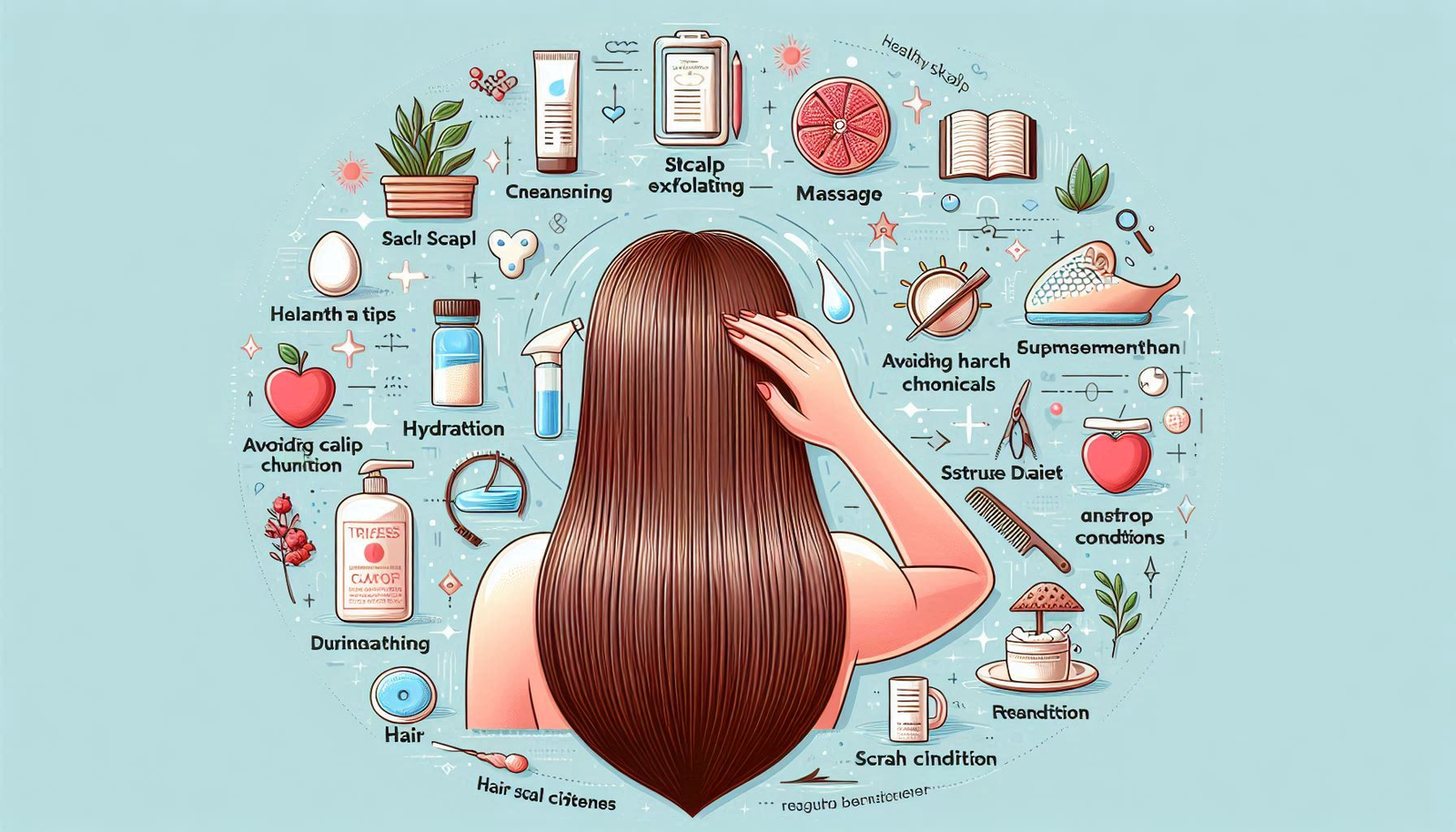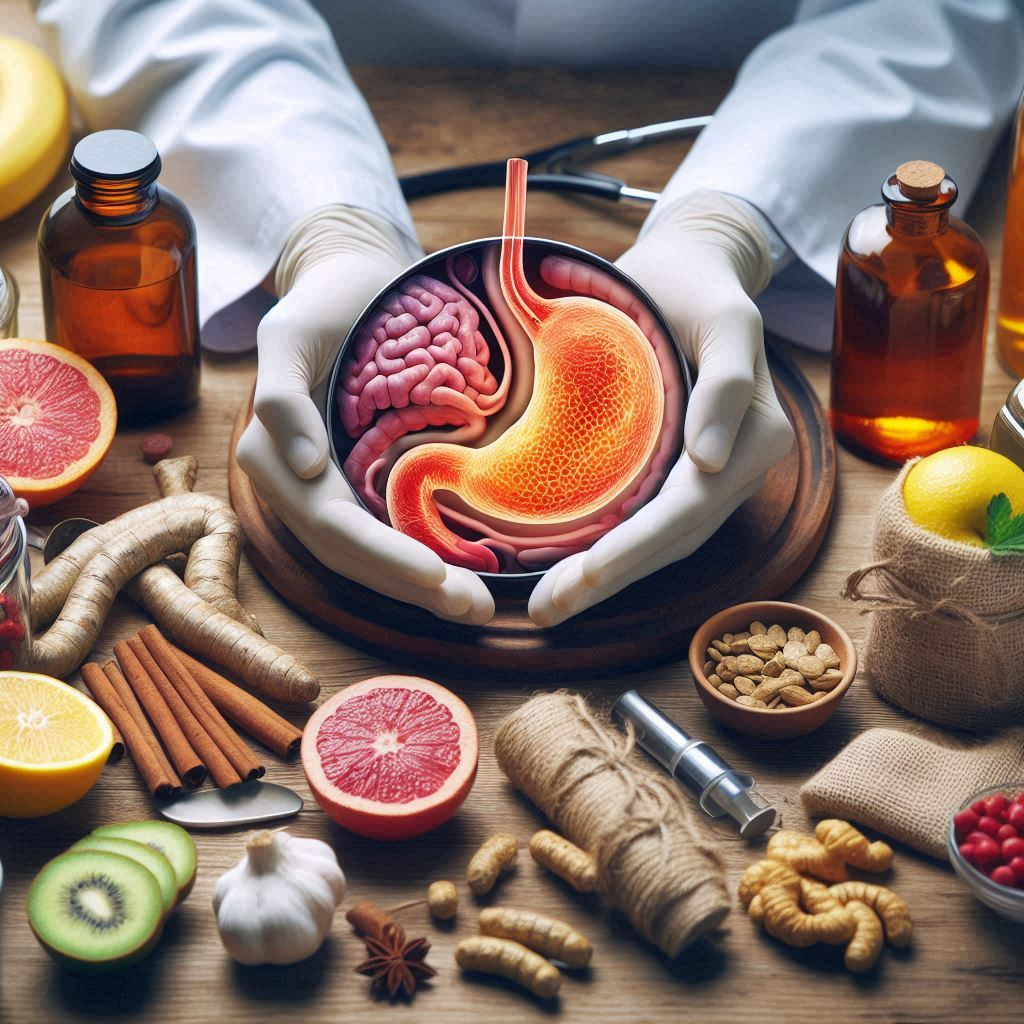
Healthy Scalp, Beautiful Hair: 10 Must-Know Tips
“Healthy Scalp, Beautiful Hair: 10 Must-Know Tips”
Top 10 scalp and hair health tips. Find natural remedies, best practices, and diet changes to improve scalp health and hair growth.

Introduction
Importance of Scalp Health for Beautiful Hair
A healthy scalp is the foundation for beautiful hair. Just like the soil that nourishes plants, the scalp provides the necessary environment for hair to grow strong and vibrant. When the scalp is well-maintained, it promotes healthy hair growth, reduces hair loss, and enhances the overall appearance of your hair.
Overview of Common Scalp Issues and Their Impact on Hair Health
Common scalp issues such as dandruff, dryness, oiliness, and scalp infections can significantly impact hair health. These conditions can lead to itching, irritation, and inflammation, which can weaken hair follicles and result in hair thinning or loss. Addressing scalp issues promptly is essential to maintain a healthy scalp and ensure beautiful hair.
Brief Introduction to the 10 Must-Know Tips for a Healthy Scalp and Beautiful Hair
In this article, we will explore 10 essential tips for maintaining a healthy scalp and achieving beautiful hair:
- Regular Scalp Cleansing
- Exfoliation for Scalp Health
- Scalp Massage
- Hydration and Moisturization
- Balanced Diet for Scalp Health
- Avoiding Harsh Chemicals
- Managing Stress
- Protecting the Scalp from Sun Damage
- Treating Scalp Conditions
- Regular Hair Trimming
By following these tips, you can improve your scalp health and enjoy stronger, shinier, and more beautiful hair.
Section 1: Regular Scalp Cleansing
Read also: 10 Powerful Benefits of Mind-Body Balance
Explanation of the Importance of Keeping the Scalp Clean
Keeping the scalp clean is crucial for maintaining a healthy environment for hair growth. A clean scalp prevents the buildup of dirt, oil, and product residues that can clog hair follicles and lead to scalp issues such as dandruff and infections.
Benefits of Regular Scalp Cleansing for Hair Health
- Prevents Buildup: Regular cleansing removes excess oil, dirt, and product residues, preventing clogged hair follicles and scalp irritation.
- Reduces Dandruff: A clean scalp helps prevent the formation of dandruff by reducing the growth of yeast and bacteria.
- Promotes Hair Growth: By maintaining a clean and healthy scalp, you create an optimal environment for hair follicles to thrive and promote hair growth.
Tips for Choosing the Right Shampoo and Cleansing Routine
- Select a Gentle Shampoo: Choose a shampoo that is free from harsh chemicals and sulfates, as these can strip the scalp of its natural oils and cause dryness.
- Consider Your Hair Type: Use a shampoo that is suitable for your hair type (e.g., oily, dry, or normal) to address specific scalp needs.
- Avoid Over-Washing: Washing your hair too frequently can strip the scalp of its natural oils, leading to dryness and irritation. Aim to cleanse your scalp 2-3 times a week, depending on your hair type and lifestyle.
- Massage While Cleansing: Gently massage your scalp while shampooing to stimulate blood circulation and ensure thorough cleansing.

Section 2: Exfoliation for Scalp Health
Explanation of How Exfoliation Helps Remove Dead Skin Cells and Buildup
Exfoliation is the process of removing dead skin cells and buildup from the scalp. This buildup can include excess oil, dandruff, and residue from hair products. By exfoliating the scalp, you can unclog hair follicles, allowing for better nutrient absorption and healthier hair growth.
Benefits of Exfoliating the Scalp for Improved Hair Growth
- Unclogs Hair Follicles: Exfoliation helps remove debris that can clog hair follicles, promoting healthier hair growth.
- Reduces Dandruff: Regular exfoliation can help reduce dandruff by removing dead skin cells and preventing the buildup of flakes.
- Improves Blood Circulation: Exfoliating the scalp stimulates blood flow, which can enhance the delivery of nutrients to hair follicles and promote hair growth.
- Balances Oil Production: Exfoliation helps regulate oil production on the scalp, preventing both dryness and excessive oiliness.
Recommended Exfoliating Products and DIY Recipes
- Exfoliating Shampoos: Look for shampoos with exfoliating ingredients like salicylic acid or tea tree oil.
- Scalp Scrubs: Use a scalp scrub with gentle exfoliants like sugar or sea salt to remove buildup.
- DIY Recipes: Create your own scalp scrub by mixing sugar or sea salt with a carrier oil (e.g., coconut oil) and a few drops of essential oil (e.g., tea tree oil). Gently massage the mixture into your scalp and rinse thoroughly.
Section 3: Scalp Massage
Explanation of the Benefits of Scalp Massage for Blood Circulation and Relaxation
Scalp massage involves gently massaging the scalp with your fingertips or a scalp massager. This practice can improve blood circulation, reduce stress, and promote relaxation. Enhanced blood flow to the scalp delivers more oxygen and nutrients to hair follicles, supporting healthy hair growth.
Techniques for Effective Scalp Massage
- Fingertip Massage: Use your fingertips to gently massage your scalp in circular motions. Start at the front of your scalp and work your way to the back, covering all areas.
- Scalp Massager: Use a scalp massager tool with soft bristles to stimulate the scalp. Move the massager in circular motions, applying gentle pressure.
- Oil Massage: Apply a few drops of a nourishing oil (e.g., coconut oil, jojoba oil) to your scalp before massaging. This can enhance the benefits of the massage and provide additional hydration.
Recommended Oils and Tools for Scalp Massage
- Oils: Coconut oil, jojoba oil, argan oil, and castor oil are excellent choices for scalp massage. These oils provide nourishment and hydration to the scalp and hair.
- Tools: Scalp massagers with soft bristles or silicone tips are effective for stimulating the scalp and promoting relaxation.
Section 4: Hydration and Moisturization
Importance of Keeping the Scalp Hydrated and Moisturized
Hydration and moisturization are crucial for maintaining a healthy scalp. A well-hydrated scalp prevents dryness, flakiness, and irritation, creating an optimal environment for hair growth. Just as our skin needs moisture to stay healthy, so does our scalp.
Benefits of Hydration for Scalp and Hair Health
- Prevents Dryness: Keeping the scalp hydrated helps prevent dryness and flakiness, reducing the risk of dandruff.
- Reduces Itchiness: A well-moisturized scalp is less likely to become itchy and irritated.
- Promotes Hair Growth: Hydration supports the health of hair follicles, promoting stronger and healthier hair growth.
- Enhances Hair Appearance: Well-hydrated hair is more likely to be shiny, smooth, and less prone to breakage.
Tips for Using Hydrating Products and Natural Remedies
- Hydrating Shampoos and Conditioners: Use shampoos and conditioners formulated with hydrating ingredients like aloe vera, glycerin, and hyaluronic acid.
- Leave-In Conditioners: Apply leave-in conditioners or hair masks to provide extra moisture to the scalp and hair.
- Natural Oils: Use natural oils such as coconut oil, argan oil, or jojoba oil to moisturize the scalp. Massage a small amount of oil into your scalp and leave it on for a few hours or overnight before washing it out.
- Aloe Vera Gel: Apply pure aloe vera gel to the scalp to soothe and hydrate. Aloe vera has anti-inflammatory properties that can help reduce scalp irritation.
- Stay Hydrated: Drink plenty of water throughout the day to keep your body and scalp hydrated from the inside out.

Section 5: Balanced Diet for Scalp Health
Explanation of How Diet Impacts Scalp and Hair Health
A balanced diet plays a significant role in maintaining scalp and hair health. The nutrients we consume provide the building blocks for healthy hair growth and scalp function. A diet lacking in essential nutrients can lead to scalp issues and weakened hair.
Essential Nutrients for a Healthy Scalp and Hair Growth
- Protein: Hair is primarily made of protein, so consuming adequate protein is essential for hair growth and strength. Sources include lean meats, fish, eggs, beans, and nuts.
- Omega-3 Fatty Acids: Omega-3 fatty acids help maintain scalp health by reducing inflammation and promoting hydration. Sources include fatty fish (e.g., salmon, mackerel), flaxseeds, and walnuts.
- Vitamins A and C: These vitamins support the production of sebum, the natural oil that keeps the scalp moisturized. Sources include carrots, sweet potatoes, spinach, and citrus fruits.
- Biotin: Biotin (vitamin B7) is essential for hair growth and scalp health. Sources include eggs, nuts, seeds, and whole grains.
- Zinc: Zinc helps repair hair tissue and maintain the oil glands around hair follicles. Sources include oysters, beef, pumpkin seeds, and lentils.
- Iron: Iron supports healthy blood flow to the scalp, ensuring that hair follicles receive adequate oxygen and nutrients. Sources include red meat, spinach, and lentils.
Recommended Foods and Supplements for Scalp Health
- Leafy Greens: Spinach, kale, and other leafy greens are rich in vitamins and minerals that support scalp health.
- Nuts and Seeds: Almonds, walnuts, and chia seeds provide essential fatty acids and vitamins for healthy hair growth.
- Berries: Berries like strawberries, blueberries, and raspberries are high in antioxidants and vitamins that promote scalp health.
- Fish: Fatty fish such as salmon and mackerel are excellent sources of omega-3 fatty acids.
- Eggs: Eggs are rich in protein, biotin, and other essential nutrients for hair growth.
- Supplements: Consider taking supplements such as biotin, omega-3 fatty acids, and multivitamins if you have difficulty getting enough nutrients from your diet.
Section 6: Avoiding Harsh Chemicals
Explanation of the Negative Effects of Harsh Chemicals on the Scalp
Harsh chemicals found in many hair care products can strip the scalp of its natural oils, leading to dryness, irritation, and inflammation. These chemicals can also weaken hair follicles, resulting in hair breakage and loss. Common harsh chemicals include sulfates, parabens, and synthetic fragrances, which can disrupt the natural balance of the scalp and cause long-term damage.
Benefits of Using Natural and Gentle Hair Care Products
- Maintains Natural Oils: Natural and gentle products help preserve the scalp’s natural oils, keeping it moisturized and healthy.
- Reduces Irritation: Using products free from harsh chemicals can reduce the risk of scalp irritation and inflammation.
- Promotes Hair Health: Gentle hair care products support the health of hair follicles, promoting stronger and healthier hair growth.
- Environmentally Friendly: Natural products are often more environmentally friendly, as they contain biodegradable ingredients and are free from harmful chemicals.
Tips for Identifying and Avoiding Harmful Ingredients
- Read Labels: Always check the ingredient list on hair care products. Avoid products that contain sulfates, parabens, synthetic fragrances, and other harsh chemicals.
- Look for Certifications: Choose products that are certified organic, cruelty-free, and free from harmful chemicals.
- Opt for Natural Ingredients: Select products with natural ingredients such as aloe vera, coconut oil, shea butter, and essential oils.
- DIY Hair Care: Consider making your own hair care products using natural ingredients to ensure they are free from harmful chemicals.
Section 7: Managing Stress
Explanation of How Stress Affects Scalp and Hair Health
Stress can have a significant impact on scalp and hair health. When you are stressed, your body produces higher levels of cortisol, a hormone that can disrupt the normal functioning of hair follicles. This can lead to hair thinning, hair loss, and scalp issues such as dandruff and inflammation. Chronic stress can also weaken the immune system, making the scalp more susceptible to infections and other problems.
Benefits of Stress Management for Overall Well-Being
- Improves Scalp Health: Managing stress can help reduce scalp inflammation and prevent hair loss.
- Enhances Hair Growth: Lowering stress levels can promote healthier hair growth by supporting the normal functioning of hair follicles.
- Boosts Immune System: Reducing stress strengthens the immune system, helping to protect the scalp from infections and other issues.
- Promotes Mental and Emotional Well-Being: Effective stress management can improve overall mental and emotional health, contributing to a better quality of life.
Tips for Reducing Stress Through Relaxation Techniques and Lifestyle Changes
- Practice Mindfulness: Engage in mindfulness practices such as meditation, deep breathing exercises, and yoga to reduce stress and promote relaxation.
- Exercise Regularly: Physical activity can help reduce stress levels and improve overall well-being. Aim for at least 30 minutes of exercise most days of the week.
- Get Adequate Sleep: Ensure you get enough restful sleep each night to help your body recover from stress and maintain overall health.
- Maintain a Healthy Diet: Eating a balanced diet rich in nutrients can support your body’s ability to cope with stress.
- Connect with Others: Spend time with friends and family, and seek support from loved ones to help manage stress.
- Set Boundaries: Learn to say no and set healthy boundaries to prevent overcommitting and feeling overwhelmed.

Section 8: Protecting the Scalp from Sun Damage
Explanation of the Impact of UV Rays on Scalp Health
UV rays from the sun can cause significant damage to the scalp, just as they can to the skin. Prolonged exposure to UV rays can lead to sunburn, dryness, and irritation of the scalp. Over time, this damage can weaken hair follicles, resulting in hair thinning and loss. Additionally, UV rays can accelerate the aging process of the scalp, leading to premature graying and other issues.
Benefits of Protecting the Scalp from Sun Damage
- Prevents Sunburn: Protecting the scalp from UV rays helps prevent painful sunburn and reduces the risk of skin cancer.
- Maintains Scalp Moisture: Shielding the scalp from the sun helps retain its natural moisture, preventing dryness and flakiness.
- Preserves Hair Health: By protecting the scalp, you can maintain the health of hair follicles, promoting stronger and healthier hair growth.
- Reduces Premature Aging: Protecting the scalp from UV damage can help prevent premature aging, such as graying and thinning of hair.
Tips for Using Sun Protection Products and Wearing Hats
- Use Sunscreen: Apply a broad-spectrum sunscreen with an SPF of at least 30 to exposed areas of the scalp, especially if you have thinning hair or a parting.
- Wear Hats: Wear wide-brimmed hats or caps to provide physical protection from the sun. Hats made from breathable materials like cotton or straw are ideal for keeping the scalp cool.
- Seek Shade: Whenever possible, stay in the shade during peak sun hours (10 a.m. to 4 p.m.) to minimize UV exposure.
- Use UV-Protective Hair Products: Look for hair care products that contain UV filters to provide additional protection for your scalp and hair.
Section 9: Treating Scalp Conditions
Overview of Common Scalp Conditions
- Dandruff: Characterized by flaky, itchy skin on the scalp, dandruff is often caused by an overgrowth of yeast or a sensitivity to hair care products.
- Psoriasis: A chronic autoimmune condition that causes red, scaly patches on the scalp. Psoriasis can be triggered by stress, infections, or certain medications.
- Eczema: Also known as atopic dermatitis, eczema causes red, itchy, and inflamed skin on the scalp. It can be triggered by allergens, irritants, or stress.
Benefits of Treating Scalp Conditions for Hair Health
- Reduces Discomfort: Treating scalp conditions can alleviate symptoms such as itching, redness, and flakiness, improving overall comfort.
- Prevents Hair Loss: Addressing scalp conditions can help prevent hair loss caused by inflammation and irritation of hair follicles.
- Promotes Healthy Hair Growth: A healthy scalp provides the ideal environment for hair follicles to thrive, promoting stronger and healthier hair growth.
Recommended Treatments and Remedies for Various Scalp Conditions
- Dandruff: Use anti-dandruff shampoos containing ingredients like zinc pyrithione, ketoconazole, or salicylic acid. Regularly exfoliate the scalp to remove flakes and reduce buildup.
- Psoriasis: Consult a dermatologist for prescription treatments such as topical corticosteroids, vitamin D analogs, or phototherapy. Over-the-counter options include coal tar shampoos and salicylic acid treatments.
- Eczema: Use gentle, fragrance-free shampoos and conditioners to avoid irritation. Apply moisturizing treatments like aloe vera gel or coconut oil to soothe and hydrate the scalp. In severe cases, consult a dermatologist for prescription treatments.
Section 10: Regular Hair Trimming
Explanation of the Importance of Regular Hair Trimming for Scalp Health
Regular hair trimming is essential for maintaining scalp health and promoting healthy hair growth. Trimming helps remove split ends and damaged hair, preventing further breakage and ensuring that hair remains strong and healthy. By keeping the ends of your hair healthy, you reduce the risk of hair damage traveling up the hair shaft, which can affect the overall health of your scalp and hair.
Benefits of Trimming for Preventing Split Ends and Promoting Hair Growth
- Prevents Split Ends: Regular trimming helps remove split ends, preventing them from traveling up the hair shaft and causing further damage.
- Reduces Breakage: By removing damaged ends, trimming reduces hair breakage, resulting in healthier and stronger hair.
- Promotes Hair Growth: Healthy hair grows more efficiently, and regular trimming ensures that hair remains in optimal condition for growth.
- Improves Hair Appearance: Trimming keeps hair looking neat, smooth, and free from frizz, enhancing its overall appearance.
Tips for Maintaining a Regular Trimming Schedule
- Set a Schedule: Aim to trim your hair every 6-8 weeks to maintain healthy ends and prevent split ends.
- Listen to Your Hair: Pay attention to the condition of your hair. If you notice split ends or increased breakage, it may be time for a trim.
- Visit a Professional: Consider visiting a professional hairstylist for regular trims to ensure that your hair is cut evenly and properly.
- DIY Trimming: If you prefer to trim your hair at home, use sharp hair-cutting scissors and trim small sections at a time to avoid cutting too much.
Conclusion
Recap of the 10 Must-Know Tips for a Healthy Scalp and Beautiful Hair
- Regular Scalp Cleansing: Keep the scalp clean to prevent buildup and promote hair growth.
- Exfoliation for Scalp Health: Remove dead skin cells and buildup to improve hair growth.
- Scalp Massage: Enhance blood circulation and relaxation for healthier hair.
- Hydration and Moisturization: Keep the scalp hydrated to prevent dryness and irritation.
- Balanced Diet for Scalp Health: Consume essential nutrients for a healthy scalp and hair growth.
- Avoiding Harsh Chemicals: Use natural and gentle hair care products to protect the scalp.
- Managing Stress: Reduce stress to improve scalp and hair health.
- Protecting the Scalp from Sun Damage: Shield the scalp from UV rays to prevent damage.
- Treating Scalp Conditions: Address common scalp conditions to promote hair health.
- Regular Hair Trimming: Trim hair regularly to prevent split ends and promote growth.
Encouragement to Implement These Tips for Improved Scalp and Hair Health
By incorporating these 10 must-know tips into your hair care routine, you can achieve a healthy scalp and beautiful hair. Each tip plays a crucial role in maintaining scalp health, promoting hair growth, and enhancing the overall appearance of your hair. Consistency is key, so make these practices a regular part of your routine for the best results.
Final Thoughts on the Importance of a Holistic Approach to Scalp Care
A holistic approach to scalp care involves addressing various aspects of your lifestyle, including diet, stress management, and hair care practices. By taking a comprehensive approach, you can ensure that your scalp and hair receive the care they need to thrive. Remember, a healthy scalp is the foundation for beautiful hair, so prioritize scalp health in your daily routine.
FAQs
- Why is scalp health important for beautiful hair? A healthy scalp provides the foundation for strong and beautiful hair by promoting optimal hair growth and preventing scalp issues.
- How often should I cleanse my scalp? It depends on your hair type and lifestyle, but generally, cleansing the scalp 2-3 times a week is recommended.
- What are the benefits of scalp exfoliation? Exfoliating the scalp helps remove dead skin cells, product buildup, and excess oil, promoting a healthier scalp environment.
- How can I perform a scalp massage at home? Use your fingertips or a scalp massager to gently massage your scalp in circular motions for 5-10 minutes.
- What foods are good for scalp health? Foods rich in vitamins, minerals, and antioxidants, such as leafy greens, nuts, seeds, and fatty fish, are beneficial for scalp health.
- Why should I avoid harsh chemicals in hair care products? Harsh chemicals can strip the scalp of natural oils, cause irritation, and damage hair follicles, leading to scalp issues and hair loss.
- How does stress affect scalp health? Stress can disrupt the natural balance of the scalp, leading to issues such as dandruff, hair loss, and inflammation.
- How can I protect my scalp from sun damage? Use sun protection products designed for the scalp, wear hats, and avoid prolonged sun exposure.
- What are common scalp conditions and how can I treat them? Common scalp conditions include dandruff, psoriasis, and eczema. Treatments may include medicated shampoos, topical treatments, and natural remedies.
- Why is regular hair trimming important for scalp health? Regular trimming helps prevent split ends and breakage, promoting healthier hair growth and maintaining a healthy scalp.
By incorporating these 10 must-know tips into your hair care routine, you can achieve a healthy scalp and beautiful hair. Each tip plays a crucial role in maintaining scalp health, promoting hair growth, and enhancing the overall appearance of your hair. Consistency is key, so make these practices a regular part of your routine for the best results. A holistic approach to scalp care involves addressing various aspects of your lifestyle, including diet, stress management, and hair care practices. By taking a comprehensive approach, you can ensure that your scalp and hair receive the care they need to thrive. Remember, a healthy scalp is the foundation for beautiful hair, so prioritize scalp health in your daily routine.


